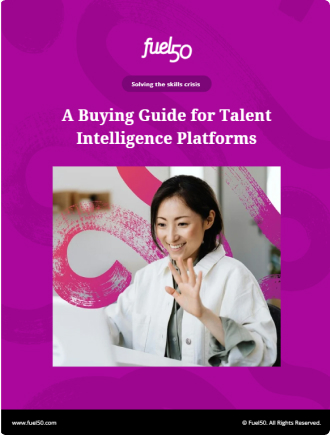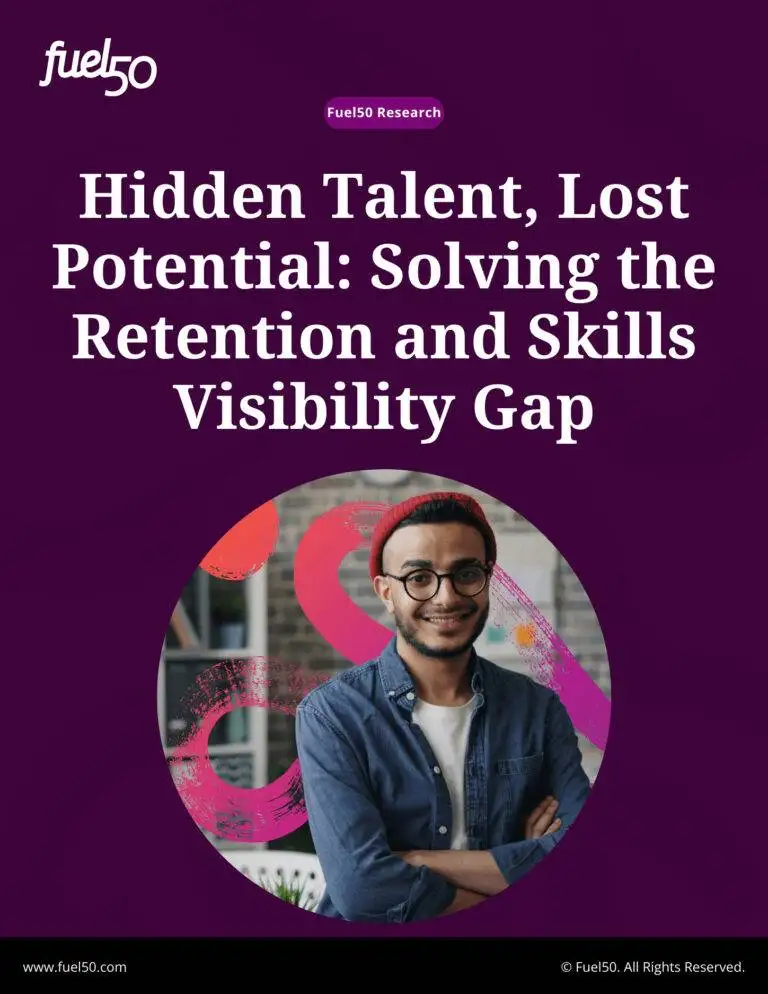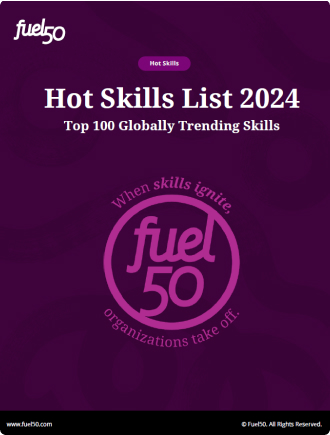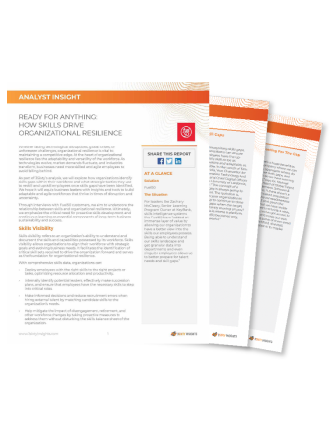If you enjoyed listening to the Talent Experience Podcast’s previous episode featuring Dave Ulrich, you’re in luck because this week we are thrilled to be sharing part two of Dave’s conversation with John Hollon! Dave is passionate about empowering others, the employee experience, and he truly believes the best is yet ahead. Leadership in our current day of work certainly is not easy but be sure to listen t0 Dave and John’s discussion to learn how to empower others in our rapidly evolving workforce.
Tune in to Dave’s episode below, at tlntx.co/davep2 or wherever you like to podcast!
Here’s how the conversation went… This interview has been edited and condensed.
John Hollon: This is the second part of the conversation I recently had with Dave Ulrich here on the Talent Experience Podcast. And that’s because we knew from our podcast with Dave two years ago, that he always has a lot of great insights into HR and talent management. And if you missed part one, please make sure to check it out, because there’s a lot of great information there too. Dave, thanks for joining us again! I wanted to ask you something about HR pros, given the chaotic state of work, and how many workplaces have been affected, virtually all of them I would guess, over the last two years, two and a half years. What’s the most critical and essential advice you could give to an HR person now moving ahead? What did they need to be thinking about? What do they need to be doing?
Dave Ulrich: There’s a saying in French, and I’m going to demonstrate that don’t speak French, because I’m going to say it in French and then translate it plus ça change, plus c’est la même chose, the more things change, the more they’re the same. I think the advice for HR is the same. HR is not about what you do. It’s about the value of what you do for others. Are you doing things to create value? So, my advice to an HR person is to say, you’ve got a lot of things you got to do. And what can you do that will help other people get better? Let me give a very quick example. A lot of people have studied leadership and John, you’ve written about it and Fuel50 has done, a lot of people have done a great work on leadership with studies, my simplest test of a good leader, do I leave an interaction with him or her feeling better or worse about myself? When I coach a leader, think about the people you’ve met with lately, did they leave feeling better or worse about themselves? In some ways, the value is not what you do as a leader. It’s how you help other people get better. Use your power to empower others use your strengths to strengthen others. That’s HR, use our HR tools to help other people get better. That could be employees. That could be the business goals. That could be customers, it could be investors. So, my advice, HR people have stopped for a minute. Think about what we’re trying to accomplish as a result of the work we’re doing. Now I got a simple tip, I love simple tips. We’re doing diversity work, which is so critical. We all believe that it so that we’re doing culture change work, so that we’re doing hybrid organization so that. When I put the words so that behind my activity, I begin to focus on the value that it creates for somebody else. And so, my advice to HR people is constantly be on the lookout, not just for innovative work, but for innovative work so that somebody else gets benefit.
John Hollon: Yes, very much. So. I also wanted to ask you about this trend of hybrid work and remote work and such. Do you think that’s a long-term trend? Do you think that is going to stick? I have always thought that the biggest thing that gets lost with that is culture. Company culture flows from having people together in a workplace doing things and harder to manage not impossible, but harder. When you have remote staff, do you think that’s going to keep going on the way it has been? Do you think it’s sort of a transitional phase as we get to something else?
Dave Ulrich: Well, I’m gonna answer that, John with a question. Where are you right now physically?
John Hollon: I’m at home.
Dave Ulrich: I’m in my daughter’s guest house. You know what, virtual work isn’t new. John, you and I have met a number of times we’ve met in airports we’ve met at conference centers; we’ve met in hotels at a meeting. You know what virtual work isn’t new. So that’s the first one stop. Sometimes I think we owe hybrid work; we’ve never seen it before! Knowledge work has always been the number two. Not everybody can do virtual work. You’re in a manufacturing plant. You got to be there. You’re in a healthcare system. You got to be there. And so, it’s not for everyone. Now, having said that, I think COVID, and technology combination allows more people to have access to that. And I think John, you’re right. I think there’s goods and bads. I think what we’re going to see in hybrid work that’s not new, is we’re going to have it much more personalized. Some people, some places, sometimes can do hybrid work. That may be two days or three days at the office, I get a little frustrated when one CEO says, “If you don’t come back to work in the office, you’re fired.” Well, that’s stupid. Another company says everybody can work wherever they want, that’s equally stupid. I think what we’re gonna see is a navigation of that paradox. Some people, some jobs, sometimes, you can do anywhere. Now, to your point, we’ve got to learn how to create culture, across boundaries. And I think it is more difficult. Two tips, tip number one, when you are physically together, which I think is powerful, before we started, you talked about conferences where people are face to face. Oh, do I love face to face, I’ve done a lot of webinars in the last two years, I’ve been to face to face, and it is so much more fun to be face to face. Because you get energy, you get freshness, you get vitality. When people come into the office, don’t do work you could have done at home, don’t go into your cubicle, and do a spreadsheet. You could have done that in a coffee shop, you could do that at home, come together to be together. Now to your point about culture. And this is my peeve with hybrid work. And hybrid work. People are really exercised about where are you going to work? At Starbucks, at a coffee shop, at home, in the office? And how are you going to work? Are you going to work virtually your technology synchronous, asynchronous? How are you going to work? By the way? I think that’s the wrong question. I think the right question, and it’s around culture, what work did you do today that will create value for a customer. Culture is not just our values, it’s what we do with our values that creates value for a customer. So, the unifying culture, John across boundaries, wherever we work, home office, etc. are we collectively doing things that will create value for our customers today or tomorrow? That can be a unifying culture, even though we may not be physically together. So, in this podcast, you and I are both committed that somebody listening to this will get an idea that helps them. By the way, if we’re not committed to that, if this is just so John and Dave can talk to each other, that’s a useless podcast. We’re really focused on trying to put out ideas. At Fuel50, we’re trying to put out ideas so that those who use our knowledge will get better. And if we can focus on that, as a unifying culture, there may be a way where we work and how we work doesn’t matter as much as why we work and what we work on.
John Hollon: Well, one of the reasons why I asked you the question about the trend of hybrid work and remote work, I’ve been surprised by some of the stories I see about companies giving like ultimatums. You know, you must come back by this date. And I think have they learned nothing of the last two years?
Dave Ulrich: Well, and I mean, isn’t that stupid, by the way, both ultimatums you can work anywhere you want. Well, that’s equally stupid, you must come back. I mean, that’s the all or nothing phenomena that just gets in our way. I mean, management is more subtle, it’s more paradoxical and personalized. Some work I need to do when I’m writing a paper, I need to be in a room with my co author, we need a whiteboard, and we need to put on the board ideas. We need to look at each other and argue some work I need to do sitting at home in front of my laptop, but nobody around me. And I think the job the person the situation, I think we’re gonna have a good leader. By the way, those edicts are just stupid. I mean, they’re to be honest, and they’re managing with a sledgehammer and a machete, not with a scalpel. And, and what’s going to happen in those companies is good employees are going to say I leave I mean, there. That’s not very thoughtful. On the other hand, if you can live anywhere, you want to do anything you want, work anytime you want, that’s not going to work either. Because you do have to make commitments, you do have to serve a customer. If you didn’t serve a customer today or tomorrow, the third or fourth day, you’ll be able to not serve a customer all by yourself.
John Hollon: Very, very true. Hey, one of the things too, that I saw in some of the various great articles on your RBL website, was talking about agile organizations. Can you talk about that a bit and what advice you have for managers and leaders about about building one?
Dave Ulrich: You know, the first comment I’d make is, we love to put new words on old concepts. Agile is not a new idea. When I was doing my PhD, quick anecdote, this was decades and decades ago before most people who listen are born. To get your dissertation you had to take classes and then you had to write an essay, and they give you a topic and you had like 48 hours to write an essay and the had to show that you knew the field. I remember writing an essay and my title, I still remember the title. It was like 12 pages, 15 pages. When why and will OD OD? OD is a field of organizational development. Today we call it agility. I mean, yeah, when why and will OD OD. By the way, I’ll always remember that because I turned in my 10 to 12 page essay, my 48 hour essay on OD and change, and today we call it agility. And my professor looked at me, he said, Dave, this is not a time and a place to be creative. We will discover in six months, if you’ve learned to be a little more serious about this field. I failed my exam. And now why do I say that? OD is what we called it, John, you probably remember. That was changed. Then we went into change, and we went into speed. Now it’s agility, build on that path. Now, having said that, no question. If an organization inside cannot respond as quickly as the external conditions outside, it’s going to go away. It’s going to go away. And the legacy of companies it’s amazing in a longevity way to look at the first list of the Fortune 500 60 years ago. How many of those still exists today? The 500 largest firms, it’s less than 50, we’ve had a 90% failure rate, because they weren’t agile, they didn’t change, they didn’t adapt, they didn’t respond. I think in building agility, which is critical today is critical, or more so than ever. Three things, define what it is. What does agility mean in behavioral terms focused on the future learning and adapting. Number two, define where it applies. Strategic agility, new products, new services, new market opportunities, organizational agility, rugby teams, ecosystems, whatever you want to call it. Leadership agility, new skills for leaders, personal agility. Are you learning? What is agility? Where does it apply? And third, how do you create it? Let’s build HR practices that encourage agility, hire people who are different, train, pay. We’re gonna we’re gonna base 30% or 40% of your bonus based on a vitality index percent of products created in the last two years. So, what it is, where it applies, and how do you create it? And I think if you take those three dimensions, you can build an agility blueprint for your company. Again, it’s not all new, but build on that OD work that we used to do, or development work, and bring it into the current stage.
John Hollon: How much do you think the last two years and what we’ve been through in the workplace will drive a real discussion about improving the employee experience?
Dave Ulrich: John, what do you think?
John Hollon: Well, I hope it’ll do a lot. I know the follow through on things like that tends not to be so great.
Dave Ulrich: Yeah, I get worried that we have a blip. You know, when 911 happened decades ago, Walmart had a blip. They were selling Americana and wedding rings. People wanted to formalize a relationship, and they wanted to be loyal to their country. I hope this is not a blip. We’ve seen an employee primacy; we’ve seen the criticality of people the last two years. I hope that what we see and let me tell you why I’m a bit of an optimist, and I tend to be more optimistic. I think we’re seeing that employee experience is not just about the employee. There’s a strong correlation that’s been shown by many others, between employee experience and customer experience. If I’m going to have a better experience as a customer in a hotel chain, in a restaurant, in a retail store, the biggest single predictor of that is not the product because every hotel has rooms. It’s the experience I have with the employee, and their experience becomes my experience. And so, I think out of this crisis, we’re going to start to see business leaders saying if I can create a better employee experience, I will create a better customer experience. And that becomes a virtuous cycle. And so, employee experience is not just to make employees happy or fun, it’s to help employees happy, fun engage, so that our customers have a better experience. In HR we say, we’re the people. Well, here’s a great insight, our employees are people. So are our customers, so are our investors, and if we can take the principles of people, with the employees inside the customers and investors and communities outside, then I think we create a more successful holistic experience that will be sustained.
John Hollon: You talk to a lot of businesses leaders and a lot of HR professionals and such, was there anything that happened that you heard about or that you talked about over the last two years that really surprised you and sort of like, wowed you that, wow, this is something I never expected to see or hear.
Dave Ulrich: You know, because I’m old, you say, we’ve seen and heard, I remember, and I’m old enough to have been in a room with Peter Drucker. And he said, the greatest management practice in the history of the world was the pyramids. And we’ve really not developed anything sense. Now, obviously, we have, but let me tell you, the thing that really strikes me, is that I think leaders are recognizing that, and I’m gonna go back to what I said before and give an example. The job of a leader, no matter if you’re in person or virtual, is to help somebody else feel better about themselves. In the last year, I’ve been able to coach a leader, big companies, successful company, not an HR leader, but a very, very senior seasoned leader. And one of that leaders’ employees made an egregious mistake. Huge mistake and it cost the company a lot of money. This company was working remotely and so a lot of the discussion was, was through email better in person better through conversation, and I said to the leader, before you send out your emails, or have a conversation with that employee, let me coach you. And the person for some reason said, okay, I’ll try it. Here’s what the person, the person I was coaching said, “You made a huge mistake, it’s going to cost us an enormous amount of money. If you don’t fix it, you’re fired.” That’s kind of tough. And leadership has to be tough at times. So, here’s how I changed it. I added three sentences, I care about you. You have great potential at this company. You made a huge mistake. it’s going to cost us a lot of money. Let’s learn from it so we can get better. John, that struck me so powerful is you made a huge mistake, and it’s going to cost us money. You can’t walk away from that there isn’t accountability, there is a responsibility of leadership. But notice how it was coached. I care about you, you have potential instead of a threat, you’re fired, it’s an opportunity, what can we learn? And John, for me in the last two years, I think being at home and being isolated, we’ve had time to reflect. I want to work with leaders who want me to improve. And I hope leaders want their employees to improve so that their customers get better. So that’s kind of an example of a takeaway, when I coach leaders, you’re gonna have difficult conversations, somebody may not still be at the company. How do you do that, so that the employee feels better? I care. I want you to succeed. And you may have to change jobs. And I’ll work with you. So that’s one of my takeaways.
John Hollon: Sounds like you’ve really honed your focus on that over the last two years that it became clearer to you about who you want to work with and exactly why.
Dave Ulrich: Again, not everybody, but while you’re sitting home, do I want to go back to the office and work in a toxic environment? Somebody did some great research, there’s an insight by sometimes I think our insights are so obvious. People don’t like working in a toxic environment. And I think, oh, my gosh, I should write that down, I would never have thought that. And so, I do think people have had time to reflect I want to work in an environment that is our term is abundant, that makes it feel good. That doesn’t mean you get to always do what you want. I mean, there still are things the company’s got to do, we got to serve customers, we got to work, if a customer has a crisis, and something didn’t work, it may mean working 48-hour shifts, it may mean working long. But on the other hand, we’re gonna work together to make it happen. So, I think the last few years, that’s been helpful for me, and I’m gonna go back down to where we started. That issue of certainty has really helped me in the last few months even, what am I certain about? For me, that’s the takeaway of the uncertainty of the last two years, I’m a lot more certain about what I care about, no matter where I’m going to do it, I may change jobs, by the way, I’m certain also about relationships, that can be certainty. And I hope I don’t change those relationships after many years. But anyway, those are a couple of things. John, what for you? You’ve done 52 shows you’re doing your 53rd show. You’ve talked to some really creative people, what one or two things jump out? I want to learn from you.
John Hollon: You know, that’s a good question. I think what jumped out at me is how many people have taken the last two years and viewed it as this gives me an opportunity to think about things and spend time on things I might not I’ve had before when I was working the way I was working then. And I think it’s made a lot of people just look at that and question, how am I doing things? What have I learned from this? What are the positives to come out of this? What are the things that I found that maybe I thought more about before, but I’ve actually found now don’t mean as much, and aren’t as good for me. I’ve been just caught by how many people think about that. They’ve spent time, they keep trying to figure out, what’s this gonna do for me longer term. And that I think, is the healthy way to do it. Though, the one thing that I’ve always missed about working remotely, and I’ve been doing it since 2010, has been, I miss the creative energy of being around people and problems that get solved when you’re back in the lunchroom getting a cup of coffee, or a drink or something or you’re warming up your lunch, or you’re looking for a candy bar from the machine there. And you just happen to be talking about something, and Kismet happens, you just get onto a problem you’ve been dealing with and boom, suddenly the light bulb goes on, you’re talking about things and you’re solving it. And you wouldn’t have had that experience had you not been doing that, that I missed, that I miss a lot.
Dave Ulrich: I agree and some of that, you know, John, in my generation, and perhaps yours, I’m older than you even if that’s at all possible. We always did that face to face, I’m recognizing that the next generation your kids and those two grandkids, for them, technology is going to be an extension of who they are. And so, they may be able to do that, through technology in ways that that I can’t, our two year old grandson, I walked into the house with him this morning. And he showed me the remote. And he said Grandpa, can you do this? I said no. And so, he did it. He knows how to do things and he can’t even talk yet and meters connections. And I get really worried about that I get worried about these relationships that are built purely on social algorithms, because I think ultimately the test of a relationship, will you be available to someone? And that’s where I think some of the Facebook, I have deep friends, John, I know you do. And I have friends where I say to that friend, I really need to talk in the next few hours. I’ve got a dozen people who would say I’ll move heaven and earth I’ll stop, like you with your kids. I love my kids, if one of your three children called and said, Dad, I’ve got a problem. I really need to connect you move heaven and earth.
John Hollon: I’d drop everything.
Dave Ulrich: I would too. And so have I in the past. I’m not sure some of our Facebook, social media friends, or that level of what’s the right word John, intimacy, connection, whatever the word is, that they wouldn’t drop everything because it’s a little more superficial. I don’t and maybe in the future, those friends will have that capacity. I don’t know. But right now, I think that face to face friendship circle is so critical that when a friend calls or when I call a friend and say, Wayne, I need to chat. I get emotional Wayne’s comment is you got it. And I hope we can continue to forge those both in and out of work. Best friend at work best friend not at work.
John Hollon: Well, what a great note to end this on. We could talk all day I think, Dave, but thank you for taking the time to be with us again today. It’s been a great conversation. You’ve been very generous with your time. We really appreciate you being here.
Dave Ulrich: John, my line, I like to end my webinars in my writing with five words, the best is yet ahead. And John, you embody that let’s always continue to not look back at what we’ve done, but it looks forward to what we can discover to do. And, John, thank you for so much that you’ve contributed. I’ve loved your writing for I don’t even want to say how long because that will show how old we are. But I’ve loved your thinking and writing and energy. You’re continually reinventing yourself and those around you. So, thank you for what you contribute.
John Hollon: Well, thanks again, Dave. And so, for the Talent Experience Podcast at Fuel50 This is John Hollon, thanks for listening!















